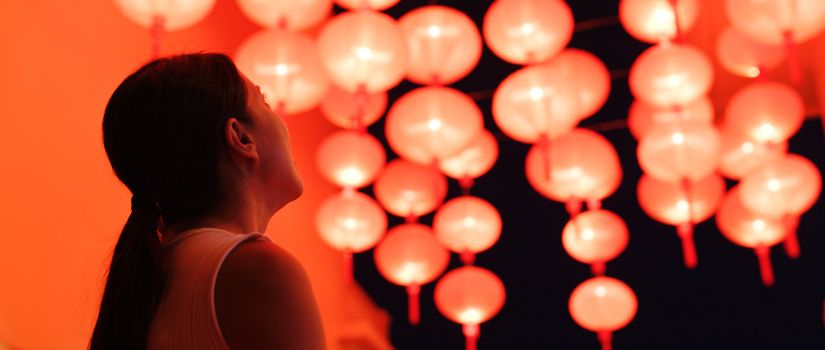The Center for Asian Studies also creates collaborative research and exchange agreements with academic centers across Asia, and it hosts one of the leading conferences on Taiwan in the United States.
Our Courses
As an Asian studies minor, you’ll learn the history, politics, and economics of the continent.
Fall 2024 Course Offerings
Instructor: Professor Amanda Wangwright
Meeting Time and Place: TTR 8:30 am - 9:45 am in McMaster 239
Course Description: History of Asian Art is a selective survey of the visual arts of India, China, and Japan from prehistory to the modern era. This course emphasizes the understanding of representative paintings, sculptures, and architectural monuments in their cultural and historical contexts. Lectures stress the methods of stylistic and iconographic analysis, as well as the religious, social, and political history of South and East Asia.
Instructor: Professor Amanda Wangwright
Meeting Time and Place: TTR 11:40 am - 12:55 pm in McKissick 306
Course Description: This seminar examines Buddhist art and architecture from China, Korea, and Japan. Weekly readings and discussions cover a range of topics, such as the development of Buddhist iconography, the transmission of artistic styles, the role of patronage and the political dimensions of Buddhist art, and the didactic function of Buddhist imagery. Lectures will address major themes throughout the history of Buddhism and Buddhist art, while readings and discussions will analyze specific issues in the study of East Asian Buddhist art.
Instructor: Professor Greg Patterson
Meeting Time and Place: MWF 12:00 pm - 12:50 pm in Gambrell 006
Course Description: This course introduces students to major issues and texts in the cultures and societies of China. We will examine key concepts, schools of thought, and time periods essential for a fundamental knowledge about the cultural history of China. Subjects to be covered include the “Three Teachings” of Confucianism, Daoism, and Buddhism; the Chinese writing system; the Mandate of Heaven and dynastic legitimacy; the revolutions of 1911 and 1949; post-socialist culture; and much more. Throughout the course, we will examine primary texts (in English translation) that explore the ideals, concerns, and debates that have shaped life in the Middle Kingdom through the ages. No prior knowledge of Chinese language or history is required.
Instructor: Professor Krista Van Fleit
Meeting Time and Place: TTR 11:40 am - 12:55 pm in Sloan College 104
Course Description: Chinese cinema presents disparate visions of what it means to be a Chinese citizen in the modern age. Would people living in Shanghai in the 1920s and 30s become global citizens by participating in a modern consumerist lifestyle, or would they fight for revolutionary change and join a different kind of world community? What did it mean to be a revolutionary in Maoist China? What kind of life was imagined with socialist change? Were women free when wearing lipstick and high heels, or in short hair and army uniforms? How does the Confucian code of brotherhood function in Chinese martial arts films? What parts of Chinese tradition should be remembered? How should we remember tragic events in China’s recent past? How does China use film to picture itself in the world in the 21st century? These are some of the questions we will ask as we watch films that have been crucial in the construction of the culture of modern China.
Instructor: Gregory Patterson
Meeting Time and Place: MWF 1:10 pm - 2:00 pm in Humanities Classroom 206
Course Description: A journey from ancient times to the contemporary period, this course invites students to examine selected literary works from the Chinese, Indian, Japanese, and Korean traditions in a variety of genres including epic, poetry, drama, and novel. The course is divided into two parts, i.e., the pre-modern and modern periods. We will pay special attention to the historical and cultural contexts in which these works were created and the mutual influences between these cultures.
Instructor: Professor Na Sil Heo
Meeting Time and Place: TTR 8:30 am - 9:45 am in Gambrell 006
Course Description: The evolution of social, political, and cultural patterns in East Asia, with emphasis on the development of philosophical, religious, and political institutions and their relationship to literary and artistic forms in China, Japan, and Korea.
Instructor: Professor Na Sil Heo
Meeting Time and Place: TTR 10:05 am - 12:55 pm in Gambrell 217
Course Description: Surveys the modern development of East Asia from 1800 to the present. (Last day of class on 10/8)
Instructor: Junkno Baba
Meeting Time and Place: M 4:40 pm - 7:25 pm in Humanities Classroom 206
Course Description: Examination of Japanese culture and society using selected films. Taught in English.
To view the complete list of course options and minor requirements visit the Asian Studies academic bulletin.
Our People
Our faculty associates come from across the university and bring unique perspectives that impart a solid interdisciplinary foundation.
Taiwan Academy
The Taiwan Academy offers a platform to learn about the history and culture of Taiwan.
